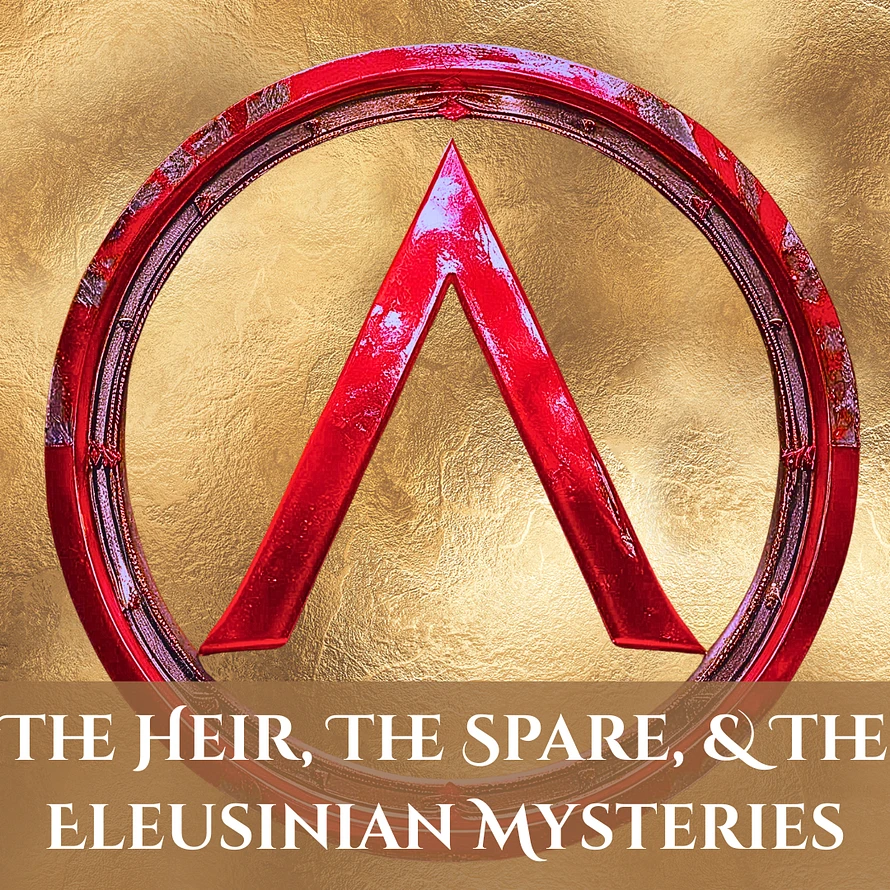The Heir, The Spare, & The Eleusinian Mysteries: Myles, Polycaon, & Messene
The Kingdom Divided
King Lelex dies in his stone fortress above Laconia, leaving behind two sons and a clear succession.
We cut to Myles sitting upon the throne of Laconia. The crown weighing him down with the weight of the responsibility ahead of him.
Paying homage to him with the rest of Myles’s subjects, is his brother Polycaon who with his fathers death became — the Greeks called "a private person." No land, no crown, no glory. This follows ancient custom of primogeniture: elder sons inherit kingdoms, younger sons are forced make their own fortunes.
Polycaon departs Laconia to seek opportunities elsewhere. Our “trusted” source Pausanias promises to reveal "the place of this retirement and its reason" but never provides details, leaving us to our imagination how a displaced prince spent his years away from royal power.
The Miller King's Innovation
Myles transforms his inherited kingdom through engineering. Within three years of his coronation, he oversees construction of humanity's first water-powered mill at Alesiae. The great wheel harnesses the mountain stream's force, turning massive grinding stones without human labor.
The innovation spreads across Laconia. His subjects call him "ΜΎΛΗΣ"—"THE MILLER"—recognizing the king who mechanized grain production. This was far more impactful than any conquest could have even if it’s not that riveting.
Myles' mills multiply across Laconia, feeding growing populations through mechanized grain production. When he dies, his son Eurotas inherits the throne, though our sources didn’t feel it’s necessary to record who Eurota’s mother was.
The Marriage Proposal
Despite there being no record of Myle’s wife, we do have record of Polycaon future match.
Years pass in his exile before opportunity reaches Polycaon through a messenger from Argos: marriage proposal to Princess Messene, daughter of Triopas.
Within Argos' palace, Messene studies the proposal. Her father Triopas rules as "the chief of the Greeks of his day in reputation and power," making this princess one of the most eligible women in Greece.
This makes makes Polycaon quite an unusual choice. He was a younger son, with no power, no territory, yet the negotiations come to an agreement and the two are wed. Sorry for all you wedding fans, we have nothing about their wedding.
The Ambitious Queen
After the wedding, Messene's true ambitions emerge. The princess who could have married any prince in Greece finds herself wed to a man without kingdom or prospects.
This makes me ponder if her father did this to remove her ambitions. If that is the case, it did not work.
Immediately after the bedding ceremony—they were now locked in marriage, the princess made her demands well known.
"I will not be content that my husband should be a private person."
The Settlement Campaign
Messene's ambition sets military plans in motion. She uses Argive resources while Polycaon mobilizes allies from his years away from Laconia. "They collected a force from Argos and from Lacedaemon and came to this country" to settle unoccupied territory.
The expedition claims empty lands through strategic occupation. When the couple overlooks their new domain, Polycaon makes the historic decision: "the whole land receiving the name Messene from the wife of Polycaon." That’s pretty radical for a male dominated society.
Building Andania
"Together with other cities, they founded Andania, where their palace was built" records our scribe Pausanias. Palace walls and sacred precincts rise together as Andania takes form from virgin ground.
Messene becomes associated with religious innovation. Caucon, son of Celaenus, brings "the rites of the Great Goddesses from Eleusis" to her, establishing mystery cult practices in the new kingdom.
The Sacred Secret Club
In ancient Greece, there were special secret religious ceremonies called "mysteries." The most famous ones happened at a place called Eleusis, near Athens. These ceremonies honored two goddesses: Demeter (who controlled farming and grain) and her daughter Persephone.
These mystery ceremonies were like exclusive clubs - only certain people could join, and they had to promise never to tell outsiders what happened during the ceremonies. People thought these rituals were very holy and powerful.
What Pausanias tells us is that a man named Caucon brought these same secret ceremonies from Eleusis to Messenia, where Messene was queen. So now Messenia had its own version of these important religious ceremonies.
Think of it like this: if the most popular, exclusive club in one city decided to open a branch in another city. That's kind of what happened with these religious ceremonies - they spread from their original home in Eleusis to Messene's new kingdom.
This was a big deal because it made Messenia seem more important and legitimate as a kingdom - they now had the same holy ceremonies as the famous places in Greece.
The Question of Heirs
Decades pass without recorded royal children. Pausanias tells us that he searched ancient sources extensively—"the poem called Eoeae and the epic Naupactia, and in addition to these all the genealogies of Cinaethon and Asius"—seeking any mention of children born to Polycaon and Messene.
It appears we wasn’t successful. Instead he just gives us his best guess as to what happened.
"In my opinion his house lasted for five generations, but no more."
Contrasting Legacies
The two brothers achieved different forms of permanence. Myles secured both technological innovation and dynastic continuity through his son Eurotas.
Polycaon and Messene created territorial identity and religious transformation. While their bloodline apparently ended, their cultural achievements endured. Later generations honored Messene with "the honors customarily paid to heroes," recognizing her role in transforming the region's spiritual landscape.
The Lasting Impact
Their achievements demonstrate different paths to historical permanence. Myles' water-powered mills served continuing human needs across generations. Polycaon and Messene's territorial conquest created lasting identity—Messenia bears its founder's name through every historical era. The mystery rites they transplanted connected local power to universal religious traditions, outlasting the dynasty that established them.
These three figures illustrate how individual innovation, territorial ambition, and sacred transformation can transcend the unescapable fact of all men must die.
Finis
Until our next chronicle unfolds, may your roads be safe and your ale cold.
The Unreliable Narrator, Arch-Loremaster of the Hall of Legends
PS: Next time, we delve into the saga of Eurotas who got a river named after himself.

